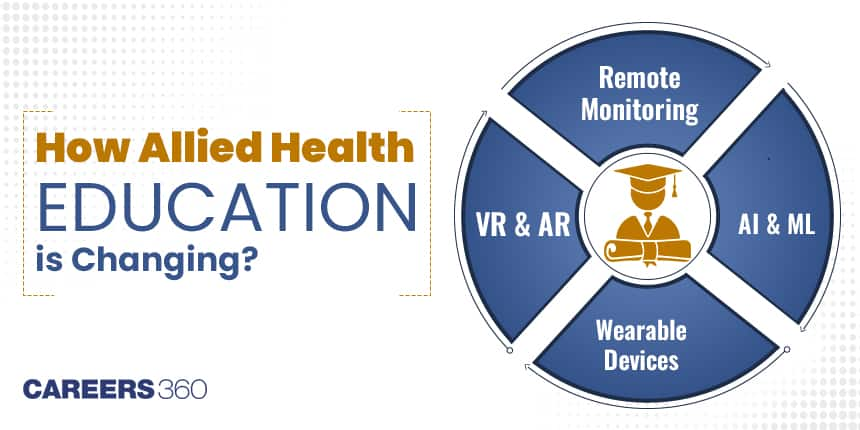Evolving Landscape of Education and Training for Allied Health Careers
Allied health professionals are critical individuals in healthcare who support doctors and nurses, and provide patient care and rehabilitation services. Various courses and certifications are offered nationwide to offer allied health science education. Like most fields, allied health science is also witnessing the impact of technological advancement.

Now, technologies like AI, ML, IoT, and VR play an important role in healthcare. So, it is important to educate allied health professionals in this evolving landscape. To succeed as an allied healthcare professional, it is also important to master the latest technologies and methodologies. Opting for a certification to learn new tools is a good starting point for allied health professionals.
What are Allied Health Jobs?
Allied health professionals have a significant role in any healthcare setting, such as hospitals, schools, clinics, rehabilitation centres, and community health organisations. They help patients by providing preventive care, treatment, diagnostics, and rehabilitation. Some of the allied health job profiles, along with their average salary, are listed below:
Job Profile | Average Salary |
|---|---|
Anesthesia Technician | Rs. 2.8 LPA |
Cardiovascular Technologist | Rs. 3.1 LPA |
Rs. 3.1 LPA | |
Dental Hygienist | Rs. 3.1 LPA |
Rs. 3.8 LPA | |
Electrocardiogram Technician | Rs. 2.3 LPA |
Radiographer | Rs. 2.7 LPA |
Rs. 2.6 LPA | |
Rs. 4.0 LPA | |
Orthoptist | Rs. 4.2 LPA |
Source: Ambition Box
How is Allied Health Education and Training Changing?
For a long time, manual techniques and tools were used by allied health professionals to provide patient care. The accuracy and efficiency of these tools were not up to standard; however, technological advancement in recent times has transformed the allied health profession.
Remote monitoring devices, wearable devices, VR and AR, and AI & ML have become an integral part of healthcare. These technologies have resulted in low cost and a high level of efficiency and accuracy. Following we have discussed the role of these technologies in allied health practice.
Remote Monitoring and Wearable Devices
Remote Patient Monitoring (RPM) devices are used to analyse and monitor patients’ activities virtually. With the help of these devices, the real-time state of patient disease is available to healthcare professionals, which helps in proactive clinical decisions. Glucometers, Pulse Oximeters, Bluetooth Thermometers, and Activity Trackers are some examples of remote monitoring devices.
Virtual Reality (VR) and Augmented Reality (AR)
The use of VR and AR in healthcare encompasses the training and education of students and interns, remote surgery, and advanced diagnosis. AR platforms can help medical students operate and conduct surgery virtually without risking the lives of patients.
Another significant use of VR is that doctors can simulate surgery before performing a real operation. It also provides doctors with all the scenarios that can occur while operating. With the help of VR, doctors can also visualise data from patients' bodies that will help them in decision-making.
Artificial Intelligence (AI) and Machine Learning (ML)
AI and ML are transforming the field of allied healthcare and offer a range of benefits for both patients and professionals. AI algorithms can analyse vast amounts of medical data such as patient records, imaging scans, and genetic information. This data helps identify patterns and anomalies that might be missed by human eyes.
AI and ML-enabled technologies provide earlier and more accurate diagnoses that can improve treatment outcomes. ML-powered tools can assist allied health professionals in decision-making. For example, AI can analyse a patient's medical history and suggest potential treatment plans as per their specific needs.
With digitalisation, the healthcare sector is also changing, and the curriculum of healthcare professionals has also been strengthened with new subjects and methodologies related to technology.
We can not deny the fact that technologies like AI, ML, and IoT will bring major changes in the healthcare domain. However, the future is unpredictable, but regular training of allied healthcare professionals with new tools can help them adapt to this change easily.
Frequently Asked Questions (FAQs)
Sonographers, medical radiation therapists, exercise physiologists, optometrists, dietitians, and nutritionists earn the highest median salaries of the allied health jobs, all bringing in a healthy average of six figures.
The NBRC clinical simulation exam has the distinction of being the hardest exam to pass of all allied health fields. This includes nursing, radiology, physical therapy and laboratory technician board exams.
MRI technologists, radiologists, OT technologists, nurses and occupational therapists are some of the highest-paid paramedical profiles.
BSc nursing andBMLT (Bachelor of Medical Lab Technology) usually offer the highest salaries, starting from ₹3–6 LPA, with scope to earn more through specialisations and experience. BSc nursing is also considered one of the best paramedical courses after 12th grade.
The best allied health course for the future depends on individual interests and career goals, but some popular and in-demand options include Medical Laboratory Technology, Radiography, Optometry, and Physiotherapy. These fields offer strong job prospects and the ability to make a significant impact on patient care.
